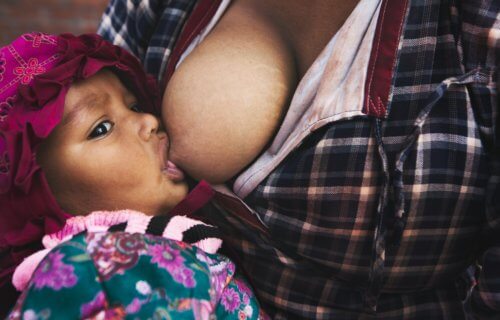AMHERST, Mass. — It is already recommended that pregnant women get vaccinated for COVID-19. Now, new research from the University of Massachusetts, Amherst reports vaccinated new moms transfer SARS-CoV-2 antibodies to their breastfed infants. These findings strongly suggest that those breastfed babies are supplied with passive immunity against the coronavirus.
To reach these findings the research team assessed immune responses to the COVID-19 mRNA vaccine across two distinct areas: breast milk and the stools of breastfed infants.
“This research is the first to detect SARS-CoV-2 antibodies in stool samples from infants of vaccinated mothers,” says lead author Vignesh Narayanaswamy, a Ph.D. candidate in the breastmilk research lab of senior author Kathleen Arcaro, professor of environmental toxicology in the Department of Veterinary and Animal Sciences, in a press release. “This is really important because women want to know whether their babies have these antibodies, and our study shows that antibodies are being transferred via breast milk. Providing this compelling evidence is motivation for women to continue breastfeeding after they receive the vaccine.”
Importantly, study authors note that antibodies were seen in breastfed infants regardless of their age. From 1.5 months old to just under two years old (23 months), if the child had been breastfed by a vaccinated mom, they had COVID-19 antibodies.
This study featured 30 lactating women. Most participating women were healthcare workers, while all participants received the COVID-19 mRNA vaccine at some point between January and April 2021. Breast milk samples were provided before being vaccinated, two to three weeks after the first dose, and two to three weeks after the second dose. Additional blood samples were also collected 19 days after the first dose and 21 days after the second dose. Meanwhile, baby stool samples were gathered three weeks after the mothers’ second vaccination dose.
From there, all samples were tested for receptor-binding domain (RBD)-specific immunoglobulin (Ig)A and IgG antibodies. Importantly, anti-RBD IgG antibodies detected in breast milk were confirmed to neutralize the protein spike of SARS-CoV-2, as well as four additional variants. Cytokine levels were also higher in post-vaccination breast milk samples.
Anti-RBD IgG antibodies were detected in 33 percent of infant stool samples and anti-RBD IgA antibodies were seen in 30 percent of infant stool samples. All in all, researchers report antibody levels in the stool samples correlated with observed vaccine side effects among mothers.
“Women who did feel sick from the vaccine was associated with greater antibodies in the infant stool,” Prof. Arcaro adds. “So you might have felt badly, but that was a benefit for your infant.”
“Even if you had COVID, there is a benefit for women to get the vaccine,” Prof. Arcaro concludes.
The study is published in Obstetrics and Gynecology.
